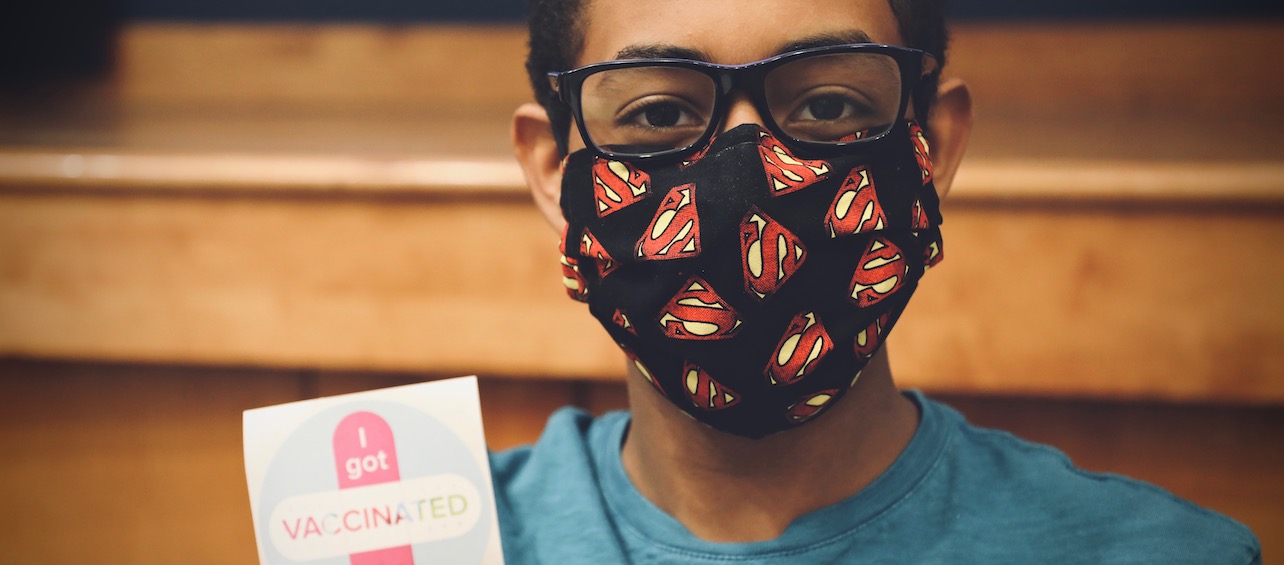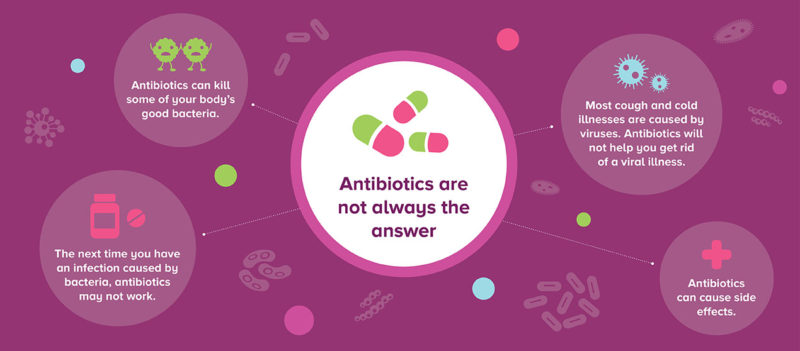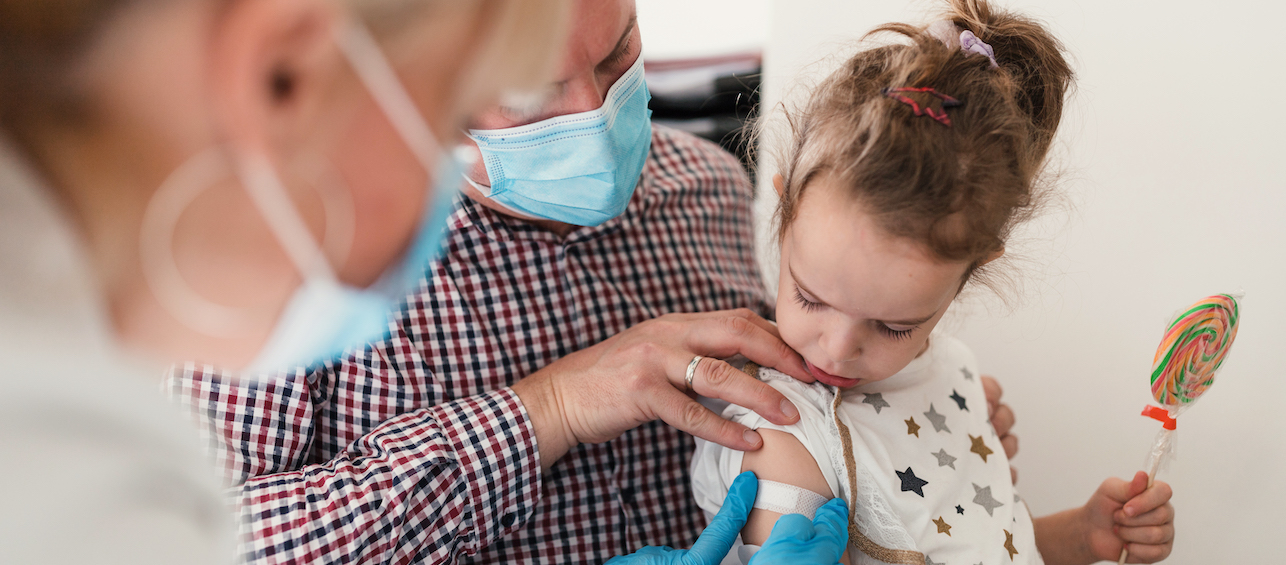It’s fall, which means flu season is ramping up. And based on data from Texas where flu cases are already abundant, this could be a very severe year for the flu and other respiratory viruses. So, it is important to protect your children against these infections.
While good handwashing and face masks are helpful, vaccines continue to be our best and longest-lasting measure to prevent disease and spread of the virus to others. As children are one of the main spreaders of flu and other respiratory viruses, many studies have shown that high immunization rates of children against flu result in protection for children as well as dramatic drops in flu infection rates in adults.
This year, in addition to vaccines against flu, we also have vaccines against COVID-19 for children six months of age and older. So naturally, parents may be wondering if their kids can get both the flu and COVID-19 vaccines at the same time.
As the director of our Center for Vaccine Research, I am often asked by families to provide recommendations about vaccinating their children. I would like to provide the community answers to some of the most frequently asked questions parents ask me about flu and COVID-19 vaccines.
FREQUENTLY ASKED QUESTIONS ABOUT THE COVID-19 AND FLU VACCINES:
1. IS IT OK FOR MY CHILD TO GET THE COVID-19 AND FLU SHOTS AT THE SAME TIME?
The short answer is, YES. There is no interaction between the vaccines and no changes in safety or protection if they are given at the same time. If your kids have never received the COVID-19 shot before, depending on their age and the COVID-19 vaccine they receive, your children will need to receive two or three of the primary doses, spread out by three to four weeks. If your child already has had the primary COVID-19 vaccine series, and if they are over five years of age, they also may be eligible to receive a COVID-19 booster. Just like the primary series, it is safe to receive the COVID-19 booster and flu shot at the same time.
2. IS THERE ANY REASON TO SPACE OUT THE COVID-19 VACCINE AND FLU SHOT?
No. The data we have show no increased safety risk and no decrease in immune response if you receive the flu shot and COVID vaccine together.
3. SHOULD I SKIP MY CHILD’S FLU SHOT THIS YEAR BECAUSE THEY’RE GETTING THE COVID VACCINE?
No. The flu shot is important every year because flu seasons are unpredictable, which typically runs October through spring. In the US, flu typically starts in the southern states and moves north. Based on 2022 data we have from Texas, this could be a VERY severe flu year. Flu deaths over the last 40 years have ranged from 3,000 to nearly 60,000 per year, according to the U.S. Centers for Disease Control and Prevention. In Cincinnati, we see 80-100 kids hospitalized with complications from the flu every flu season, many of whom are otherwise healthy.
4. WHAT ARE THE COVID-19 VACCINE SIDE EFFECTS IN KIDS? WILL THEY BE WORSE IF THEY RECEIVE BOTH VACCINES ON THE SAME DAY?
The side effects children have been experiencing, if any, are the same as those experienced by adults. The most common side effects are pain at the injection site, headache, fatigue and muscle ache. Less than 10% of children have had fever after the vaccine. Typically, the severity of the side effects is mild so most children will not miss school. However, if you wanted to decrease the risk of missing school, receiving the vaccine on a Friday could help.
A very rare side effect called myocarditis has occurred in about 1 in 100,000 adolescents who get a COVID-19 vaccine. About 80% of the cases occur in boys and young men but the side effect typically has been mild, short-lived and able to be treated at home. In contrast, the virus itself can cause myocarditis, which happens six to seven times more frequently than myocarditis following the vaccine. Further, myocarditis caused by COVID-19 tends to be more severe.
5. HOW CAN PARENTS MAKE SURE THEY’RE RECEIVING THE NEWEST BOOSTER THAT TARGETS THE OMICRON VARIANT?
Currently boosters against COVID-19 are available for children five years of age and older. It is likely within the next six months that boosters will be available for children as young as two years old and maybe down to six months of age.
Currently, all boosters provide protection against Omicron, the most commonly circulating COVID-19 variant at this time. If the virus mutates further, it may be necessary to update our boosters. However, a wonderful property of the mRNA vaccines is that updates to the vaccine can be made quickly.
6. DOES IT MATTER WHICH COVID-19 VACCINE MY CHILD RECEIVES?
Currently, the mRNA vaccines made by Moderna and Pfizer are the only vaccines against COVID-19 available for children under 12 years of age. Both vaccines are highly effective and both are very safe. For children under five years of age, they will need three doses of the Pfizer vaccine versus two doses of the Moderna vaccine.
In studies sponsored by the NIH that we performed in adults, we found that Pfizer vaccines provided a good boost for people who initially received Moderna and Moderna provided a good boost for people who initially received the Pfizer vaccine.
For children 12 years of age and older, there is another vaccine option produced by Novavax. This vaccine uses the same technology we have used for years for many other routinely-administered pediatric vaccines. Currently, Novavax is testing their vaccine in children under 12 years of age and depending on the results, may be available for use within the year.
7. IF MY CHILD HAS HAD COVID-19, DO THEY STILL NEED TO BE VACCINATED AGAINST COVID-19?
Yes. There are a lot of data to show that while infection with COVID-19 provides some protection against future infections, a person (child and adult) gets MUCH better protection if they are vaccinated after having had COVID-19. If you know your child has had COVID-19, I would wait two to three months before giving a COVID-19 vaccine. There is no evidence it is dangerous if you give a COVID-19 vaccine sooner than two to three months after infection, but it is probably not needed any sooner.
8. HOW SHOULD I SPACE OUT MY KIDS’ BOOSTERS?
If your kids are over the age of five and have already received one booster, they should wait at least three to six months before receiving another one. It is important to continue to receive these boosters, such as the latest one that targets the omicron BA.5 subvariant, because the virus keeps evolving.
9. WHERE CAN I GET MY CHILD’S COVID-19 VACCINE AND FLU SHOT?
- Your pediatrician’s office may have a supply of both the COVID-19 and flu vaccines on hand.
- Cincinnati Children’s has COVID-19 vaccine clinics available and is scheduling appointments now for those ages 5 and up.
- Most pharmacies are also scheduling appointments for both the COVID-19 and flu vaccines.
- The Cincinnati Health Department.





